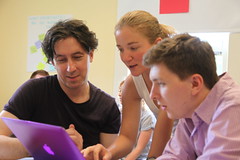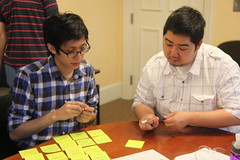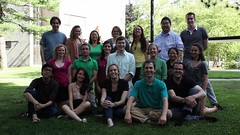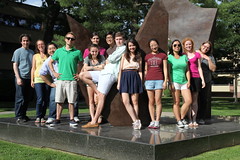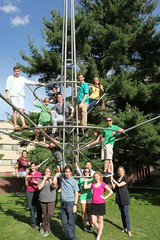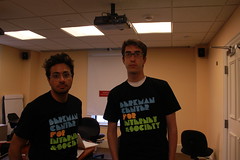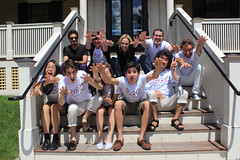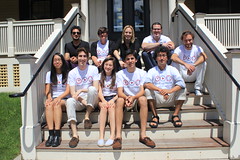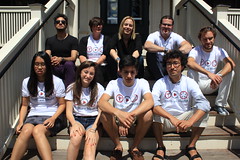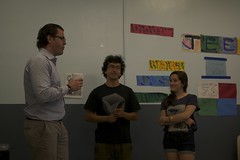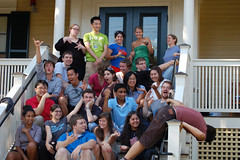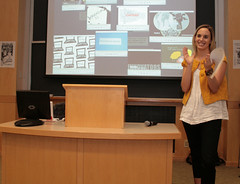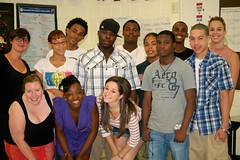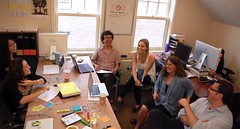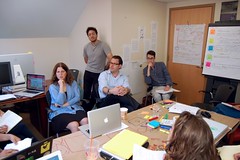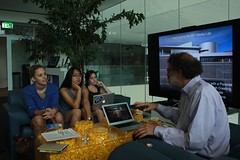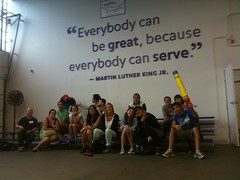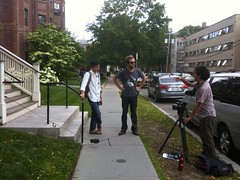The Berkman Klein Center for Internet & Society and the Pew Research Center’s Internet & American Life Project conducted focus groups with teenagers in a variety of locales as part of a larger study on teens and online privacy. Click here to access the full report and findings. What follows is a list of some of the most revealing and interesting comments about how teens think about social networking sites and how they navigate issues of identity and privacy.
Facebook is a major center of teenage social interactions, both with the positives of friendship and social support and the negatives of drama and social expectations.
Female, age 14 — “I think Facebook can be fun, but also it’s drama central. On Facebook, people imply things and say things, even just by a like, that they wouldn’t say in real life.”
Female (age 14): “OK, so I do post a good amount of pictures, I think. Sometimes it’s a very stressful thing when it comes to your profile picture. Because one should be better than the last, but it’s so hard. So… I will message them a ton of pictures. And be like which one should I make my profile? And then they’ll help me out. And that kind of takes the pressure off me. And it’s like a very big thing.”
Friending mom and dad: It’s complicated
Male (age 16): “Yeah, [I’ve gotten in trouble for something I posted] with my parents. This girl posted a really, really provocative picture [on Facebook] and I called her a not very nice word [in the comments]. And I mean, I shouldn’t have called her that word, and I was being a little bit too cocky I guess, and yeah, I got in trouble with my parents.”
Male (age 17): “It sucks… Because then they [my parents] start asking me questions like why are you doing this, why are you doing that. It’s like, it’s my Facebook. If I don’t get privacy at home, at least, I think, I should get privacy on a social network.”
Friending teachers and preachers
Female (age 14): “I think I wouldn’t [become Facebook friends with my teachers]. Just because I’m such a different person online. I’m more free. And obviously, I care about certain things, but I’m going to post what I want. I wouldn’t necessarily post anything bad that I wouldn’t want them to see, but it would just be different. And I feel like in the classroom, I’m more professional [at] school. I’m not going to scream across the room oh my God, I want to dance! Or stuff like that. So I feel if they saw my Facebook they would think differently of me. And that would probably be kind of uncomfortable. So I probably would not be friends with them.”
Male (age 18): “Yeah, I go to church and all, so I don’t want to post certain things because I don’t want the preacher looking at my Facebook. Because I go to church with her. So then if she sees me, yeah, baby, and yeah. I feel like it does affect the way you use social [media]. You have that respect for something or for a group that you’re into or anything, like… yourself, because maybe that’s who you are, but at the same time, you love that group and you never want to disrespect them. So at that point, I feel like it does affect you. Sometimes affecting you doesn’t always mean negatively. It can sometime[s] be positively, you know?”
Party tweets might get you busted
Female (age 16): “And our SRO [School Resource Officer] Officer [sic], he has information. He can see anything that we do, basically, because he’s part of the police department. And so he’s talked to my friends and I before. And he was like, anything you do, I can pull up. So if y’all tweet about a party, while you’re there, just don’t be surprised when it gets busted.”
College admissions officers can find out things
Male (age 18): “So honestly, the only time I’ve ever deleted for a picture is because I’m applying for colleges. You know what? Colleges might actually see my pictures and I have pictures like with my fingers up, my middle fingers up. Like me and my friends have pictures, innocent fun. We’re not doing anything bad, but innocent fun. But at the same time, maybe I’m applying for college now. Possibly an admission officer’s like, you know, this kid’s accepted. Let’s see what his everyday life is like. They’re like, um–”
Snapchat is catching on with teens because it enables speedy exchanges, many schools haven’t yet blocked it, and, most of all, because photos vanish after a limited amount of time
Female (age 16): “Yeah, [Snapchat] it’s faster. And you can use Snapchat at school with the school’s website.”
Female (age 16): “Well, because Facebook, everyone sees what I’m doing. But Snapchat is just to one person, unless they’re a jerk and they screenshot it and post it on Facebook. But mostly it’s just the person that you’re sending it to, so it’s like a conversation.”
Female (age 17): “And it’s just kind of fun. Because it’s like texting, but you get to use your face as the emoticon instead of an actual emoticon.”
Different social media services are used for different social purposes
Female (age 16): I am basically dividing things up. Instagram is mostly for pictures. Twitter is mostly for just saying what you are thinking. Facebook is both of them combined so you have to give a little bit of each. But yes, so Instagram, I posted more pictures on Instagram than on Facebook. Twitter is more natural.”
Female (age 15): “I mean Instagram is just basically like letting everybody else see what you’re seeing.”
Female (middle school): “I use it [Twitter and Facebook] differently. Twitter is more for me to see what my favorite celebrities are doing. Facebook is more for family and friends. Twitter feels more public to me.”
Looking good – physically and reputationally – is a big deal
Male (age 18): “Yeah, I have some teachers who have connections that you might want to use in the future, so I feel like you always have an image to uphold. Whether I’m a person that likes to have fun and go crazy and go all out, but I don’t let people see that side of me because maybe it changes the judgment on me. So you post what you want people to think of you, basically.”
Managing pictures on Facebook’s timeline takes some work
Female (age 14): “Yeah [I’ve taken down photos from my timeline], some embarrassing pictures that me and my friend took, and sometimes I don’t like that photo. And I just wanted to take it down so people won’t see them. Obviously they should ask first.”
Facebook is important as a kind of social broadcasting space
Female (age 15): “And so after school the day before, someone said ‘oh, the assembly’s sure going to be fun.’ And I’m like, ‘what assembly?’ And they’re like, ‘the assembly that we’re performing in.’ ‘What assembly that we’re performing in?’ No one had remembered to tell me, because they had only posted it on Facebook. So after that I just got a Facebook to know what’s going on.”
Facebook is a challenging space because so many others are there and watching and judging
Female (age 13): “I feel like over Facebook, people can say whatever they want to. They can message you. And on Instagram you can delete the comment really easily, and you don’t have to live with it, kind of. Whereas Facebook, if they say something mean, it hurts more. I don’t know why it does. And also [Instagram] it’s not public, so people tend to not come off so mean. Because all they really want is for people [to] like their photos.”
Location sharing doesn’t feel necessary
One teen wrote in an online focus group: “[I don’t share my location] because it seems unnecessary. If someone wants to know where you are, they can ask. I’d share my location if I was at my friend’s house because sometimes they want me to. I don’t share it definitely if I’m not somewhere that I want people to know I’m at.”
Leaving the drama can be liberating
Female (age 16): “I deleted it [my Facebook account] when I was 15, because I think it [Facebook] was just too much for me with all the gossip and all the cliques and how it was so important to be– have so many friends– I was just like it’s too stressful to have a Facebook, if that’s what it has to take to stay in contact with just a little people. It was just too strong, so I just deleted it. And I’ve been great ever since.”
About the focus groups
In collaboration with the Berkman Klein Center for Internet & Society at Harvard, this report also includes quotes gathered through a series of exploratory in-person focus group interviews about privacy and digital media, with a focus on social media sites, conducted by the Berkman Klein Center’s Youth and Media Project beginning in February 2013. The team conducted 24 focus group interviews with 156 students across the greater Boston area, Los Angeles, Santa Barbara, and Greensboro (North Carolina). Each focus group interview lasted 90 minutes, including a 15-minute questionnaire completed prior to starting the interview, consisting of 20 multiple-choice questions and 1 open-ended response. Although the research sample was not designed to constitute representative cross-sections of particular population(s), the sample includes participants from diverse ethnic, racial and economic backgrounds. Participants ranged in age from 11 to 19. The mean age of participants is 14.5.
In addition, two online focus groups of teenagers ages 12-17 were conducted by the Pew Internet Project from June 20-27th, 2012 to help inform the survey design. The first group was with 11 middle schoolers ages 12-14, and the second group was with 9 high schoolers ages 14-17. Each group was mixed gender, with some racial, socio-economic and regional diversity. The groups were conducted as an asynchronous threaded discussion over three days using the Qualboard platform and the participants were asked to log in twice per day. All references to these findings are referred to as “online focus groups” throughout the report.



